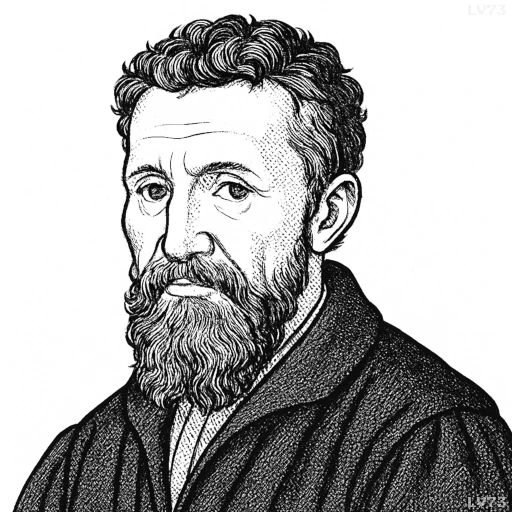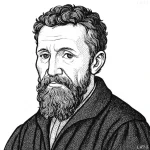“Every beauty which is seen here by persons of perception resembles more than anything else that celestial source from which we all are come.”

- March 6, 1475 – February 18, 1564
- Born in the Republic of Florence (now Italy)
- Sculptor, painter, architect, poet
table of contents
Quote
“Every beauty which is seen here by persons of perception resembles more than anything else that celestial source from which we all are come.”
Explanation
In this quote, Michelangelo reflects on the relationship between beauty in the material world and the divine or celestial realm. He suggests that true beauty, as perceived by those with discernment or wisdom, is not simply a fleeting or superficial quality, but a reflection of a higher, divine source—the origin of all things. This concept ties into Renaissance humanism, which often explored the connection between spirituality and aesthetic experience. For Michelangelo, the beauty of the human form, nature, and art were not just earthly phenomena but echoes of a divine perfection, a reflection of God’s creation. In this view, beauty serves as a reminder of our connection to something greater than ourselves, a celestial ideal that transcends the physical world.
Michelangelo’s notion that beauty here resembles its divine source aligns with the Renaissance belief that the material world was a reflection of a higher, spiritual reality. Artists of the time, especially in the wake of Platonic and Neoplatonic philosophy, believed that beauty was not just something to be appreciated in the moment but was connected to a deeper universal truth. Just as Plato suggested that the physical world was an imperfect reflection of ideal forms, Michelangelo’s work, particularly in his sculptures like the David and the Pietà, strove to embody the ideal human form, a glimpse of the divine in the physical realm. Thus, the beauty seen by those with true perception serves as a bridge between the earthly and the celestial, guiding the observer closer to the divine.
In modern terms, this quote reflects the idea that beauty is not just something to be admired for its own sake but a connection to something greater—whether one interprets that as divine, universal, or even transcendent human values. For artists, philosophers, and thinkers today, beauty can be seen as a conduit to deeper truths, whether in nature, human expression, or art. This idea still resonates in modern aesthetic theory, where beauty is often thought to reflect not only personal or cultural values but also universal principles that transcend time and place. By perceiving beauty through the lens of the divine, Michelangelo encourages a deeper, more profound engagement with the world around us, one that moves beyond the superficial to uncover higher meanings.
Would you like to share your impressions or related stories about this quote in the comments section?

